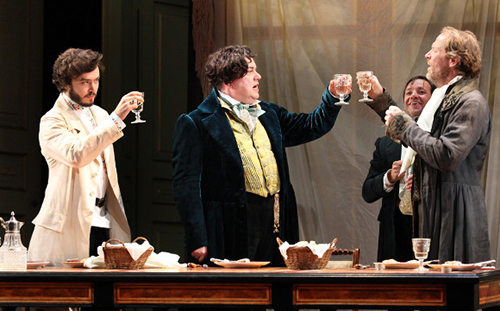
“Has a poor man no right to justice?” cries an impoverished gentleman at the merciless hands of his wealthy aggressor. Battling for a better Russia in an era brimming with political and social tension, Ivan Turgenev wrote evocative plays that were routinely banned by the imperial censors. Fortune’s Fool, written in 1848, was no exception. However, Lucy Bailey’s incarnation at London’s Old Vic has given this suppressed, Russian, countryman a fresh opportunity to be heard.
As far as audiences today revel in the plight of the underdog, Fortune’s Fool, capturing the nuanced voice of the disadvantaged, has some contemporary relevance. There’s no escaping however, that the play’s overriding values are, inevitably, outdated – verging on the anarchic. From a modern audience perspective, nothing new is being said, but what’s there is said very, very well. The production is consequently comparable to a beautifully recovered historical artefact – a museum piece.
Careful to honour Turgenev’s original intentions, this production focuses on the play’s most prevalent theme: the truth – the danger of concealing it and the consequences of revealing it. From the outset, a distinct undercurrent of danger filters somewhat disturbingly into the dormant country house which awaits the imminent return of Olga, seven years departed since, with her new husband. Enormous, looming portraits of Olga’s parents dominate the forefront of William Dudley’s set, overseeing all and weighing down on our dusty protagonist, Kuzovkin (Iain Glen), who sleeps in a closet. Too pointed for comedy, too jovial for tragedy, the audience are kept on edge throughout. The slapstick and foolery of the rowdy house staff, for example, is somehow too coarse to be entertaining. What we are rapidly able to ascertain though is the vital distinction between master, gentleman, steward and footman. Social mobility is obviously a foolish, crude notion; God forbid anyone should exceed that of their inherited position within society…
Secrets inevitably creep to the surface. Following a heavy dose of intoxication and relentless probing by the intrusive Tropatchhov (played with great comic skill and ferocity by Richard McCabe), the victimised Kuzovkin spills the beans, so to speak. Kuzovkin’s harboured secrets initially manifest themselves in Glen’s masterful physicality, both subtle and unmistakably clear, his body visibly burdened by the truths that “may destroy us all.”
The strong cast each play their parts with precision and attention to detail. However, as per the nature of the play, individuals each represent a group of people within society. The stock characters are simply cogs in Turgenev’s fiery machine and, for this reason, are never fully developed. The deep stage scattered with onlookers and eavesdroppers rapidly becomes a tense, heated landscape on which the play’s themes land, but the formulaic Fortune’s Fool does little to move its more progressive, though far from perfect, 2013 audience.
Be the first to comment